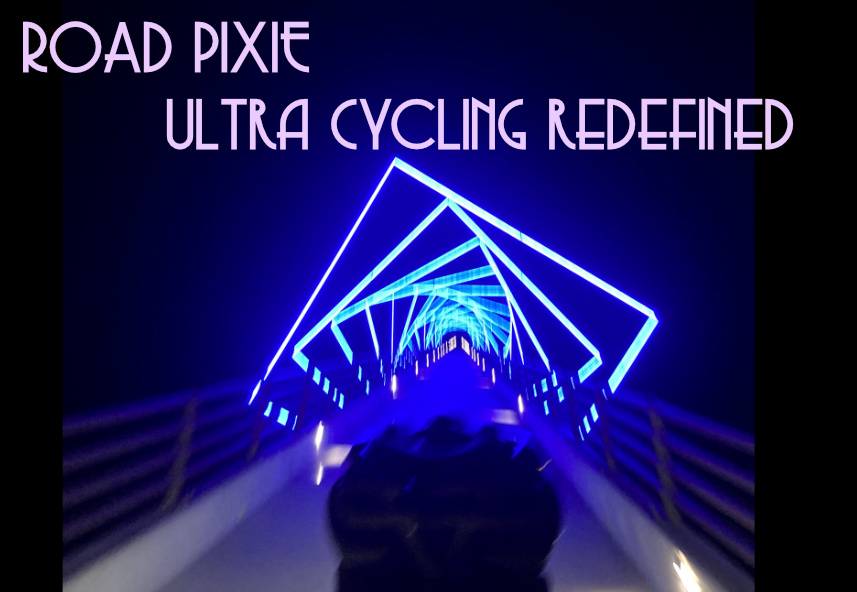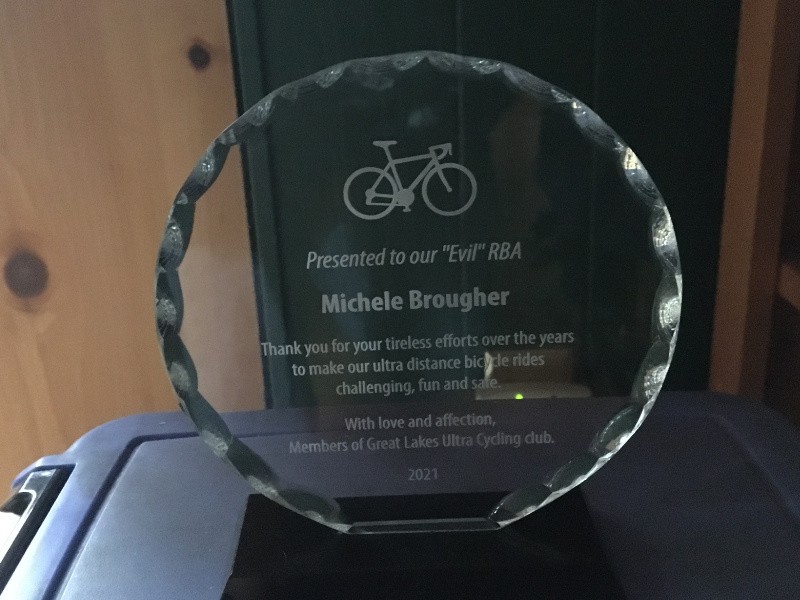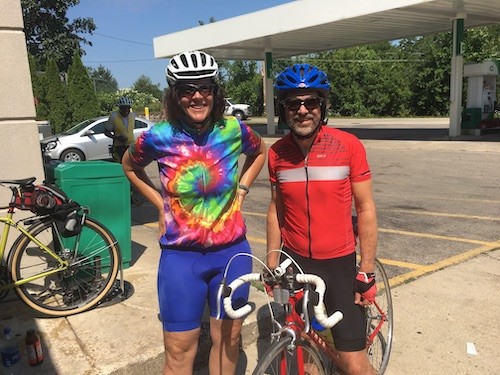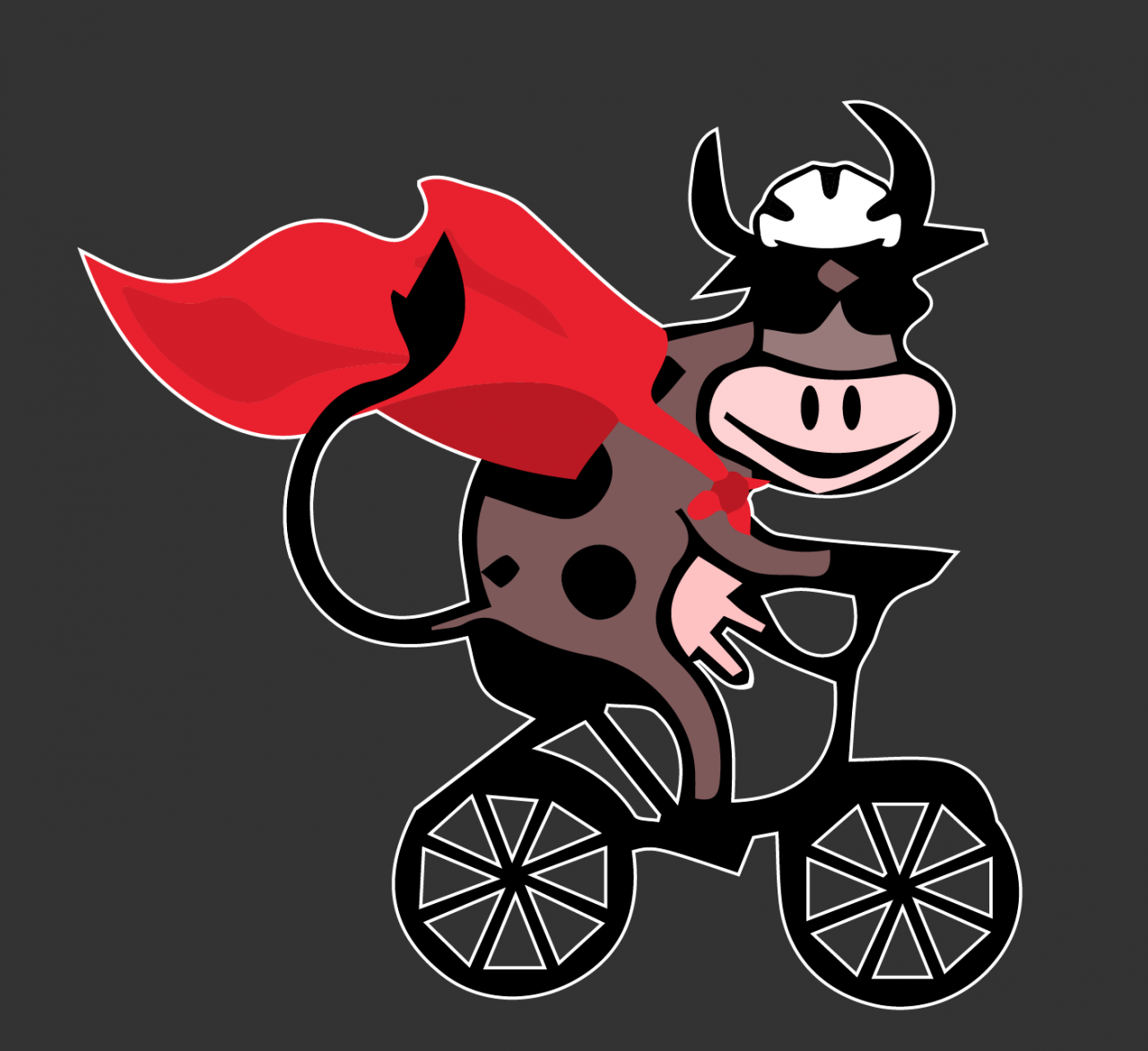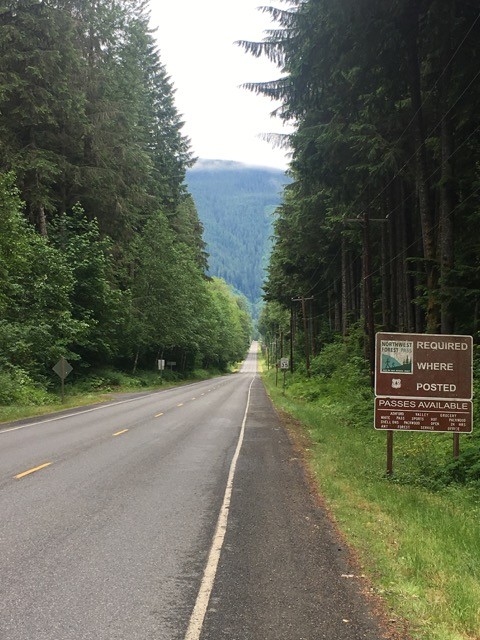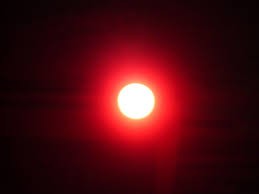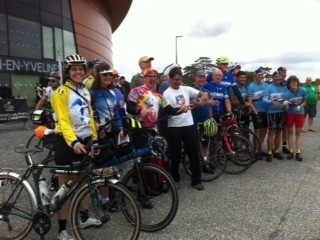I had never had a major accident before PBP; this was my first major accident. Looking back, I had complications as well and there were certainly some things that went right and wrong in the aftermath. I have hopes that by writing this post, people can look upon my experience and learn from it.
The accident itself was on Thursday morning outside Paris. Another cyclist hit me dead on from behind on a straight, relatively flat section of road. Whether he was simply tired, fixated on a mirror or just not paying attention, this was an accident plain and simple. Though he did stop to help me, I can't recall anything about him other than his lower legs. My recollections of the hit are spotty; I recall the sound of crunching metal, struggling to stay in control and having the wind knocked out of me at some point. The accident also triggered an asthma attack of epic proportion as a complication. It was pouring rain at some point, though I can't recall whether it was actually raining at the time or whether it started after the impact. But the cold rain also chilled me to the bone and I started down the hypothermia road quickly.
I was taken to a hospital in Paris by ambulance with no ID at all. I know that at least one person who knew me slightly came by the scene at some point and was at least able to inform closer friends that there had been an accident. There were no details as to where I was going or what the extent of the injuries was; other than severe asthma, I had a broken rib and a concussion.
Though certainly the breathing problems rightly deserved the attention they received (damage to my vocal chords suggests I was actually intubated at some point), the biggest problem turned out to be the concussion that went under-diagnosed until my return to the US. I can't quite blame the doctors at the hospital in France – my French after the accident was broken and it was difficult to speak. I do recall them telling me I had a concussion, but I don't remember directions other than to stay awake. No one spoke any English in the hospital and my brain may not have been translating properly. I have a vague recollection of milling around the hospital trying to pay a bill.
I was released from the hospital and put in a cab wearing paper clothes and plastic booties. I somehow relayed that I wanted to go back to my hotel and at least knew the name; during the cab ride I attempted to read through a sheaf of paperwork given to me and promptly left most of it in the cab. I recall balling up on the bed in the hotel and crying for a while, though now I don't remember why. From others, I gather that I was in a stupor for a good bit of the day and some point, I remember trying to drink a glass of juice and thinking it was quite a bit harder than it should have been.
The many people at the hotel, the Relais des Voisins, were other American randonneurs and they were great. They retrieved my bike from the start, got it packed up (no small feat, it's a coupled bike) and someone helped me pack. On Friday, I remember talking to several others about my experience and feeling marginally better.
I wasn't scheduled to leave Paris until Monday morning. Friday through Sunday I had reservations in a hotel in Paris proper where I had intended to rest up before returning to the States; other friends were staying very close by. I had a traveling companion who had also been a riding companion in PBP and who was to be with me for Friday night. She was then planning on meeting her husband to spend a few days in Paris and another week in Europe. It was here that things started going wrong.
Late Friday, the symptoms of the concussion started worsening. I have no memory at all from late Friday night until Saturday evening when I suddenly found myself alone, in an unknown place in Paris with absolutely no clue where I was, no ID or money and nothing but two locked cell phones in my pockets. Neither of the phones was configured for international use, but somehow I managed to get it working and sent a text to my best friend from high school; her name was probably the first I recognized in the texting log. The two of us have a huge history and she is what I would call "wildly capable". She figured out where I was from the confused descriptions of what I could see, directed me back to my hotel, called my spouse and together we came up with a plan for what to do as the fog lifted from my muddled brain. It wasn't the greatest plan, but it eventually worked out and I flew home direct to Minneapolis with other friends on Monday after more asthma difficulties convinced Delta that the multiple plane changes on the original itinerary were in no one's best interests (especially theirs).
I've had a hard time coming to terms with the fact that I apparently milled around Paris in a fugue state for part of a day. On Saturday morning, my traveling companion had noted the worsening symptoms, which included confusion, a worsening headache and difficulty controlling one side of my body but failed to call either my spouse or other friends nearby to make them aware. We both went to CDG to pick up her husband, returning with a long walk to the hotel about noon. Her husband was "grouchy" from his trip to Paris and uninterested in lending any assistance. They left me alone in my room at about noon and departed, not to be heard from again. I don't have recollection of any of these events. I finally got these details from an email and a phone conversation 10 days later when they returned to the States.
I'm probably never going to figure out what I did for 6 hours in Paris on Saturday. I have a couple of email responses in my sent folder, one of which talks about a massive headache. From an empty plastic bag I found later, I know that I took a large dose of Advil probably in response to the pain. Fortunately, there wasn't much or I could have probably poisoned myself. Additionally, Advil is NOT a good idea to take when you have a concussion as it can cause bleeding in the brain. It's a small miracle I survived Saturday. I could have walked out in front of a car or fallen victim to crime. As it was, I was beyond lucky.
Head injuries are tricky things, as I am finding out now. Every one is different and apparently gauging how bad they are is a very major task that ultimately can't just be put on a simple scale even by a neurologist. A severe concussion can take months or years to heal; I am forbidden to do anything but walk for transportation until all symptoms have resolved fully. That may be months from now.
I had come to France with an ocean of travel insurance and protections, but this one time, my spouse of 18 years had remained behind in the States. I was traveling with someone I considered to be a close friend, who knew me well. That gave me confidence that if anything happened, I would be covered. My insurance was laid out to the point that as soon as I was in the hospital, it would have paid for a first class ticket back to the States with a trained nurse to accompany me. I still believe that for someone in a sport like randonneuring, insurance like this is a very good idea. However all insurance does require a solid set of brains and communication to use properly. A concussion does not make that easy especially in a foreign country.
Though it is very tempting, I can't pass judgment on my friend who left me alone with a worsening head injury without calling anyone. Speaking afterwards, she acknowledges being judgment impaired herself as a result of not having slept for most of PBP. Suffice it to say that no randonneur completing a 1200k should ever consider themselves to be completely normal after an event. Her experience should be a warning to all of us. Though the differences may be subtle, they are definitely there and will likely be imperceptible in real time. My friend was a health care professional and on a normal day no one I know of would advocate leaving a person with a head injury and worsening symptoms alone in a hotel room in a foreign country and call them "safe".
As I said before, part of the reason for writing this post is that I like to learn from my errors and to share my experiences with others so that they can avoid having to learn lessons through experience. This is not an experience I would wish upon anyone. My own experience now tells me just how insidious something like episodic amnesia is. I now realize that for 48-72 hours after the accident, my brain wasn't always recording information; this manifested as worsening confusion. I was beyond lucky; a second hit to my head, even a very small one, during this period could have left me as a vegetable.
Today, I still have headaches, tire very easily and have some trouble focusing and speaking. I can't look at a screen for very long and this post has literally taken days to write as a result. I don't have my senses of taste and smell. But the good news is that as bad as it is, it could have been so much worse. The consensus is still that I will eventually recover.
For the record, I still loved my experience at PBP - this was a far better ride than 2011. In 2019, my spouse will be coming.
From the Cleveland Clinic (the full article follows), here are the suggested steps for those who are with someone who either has a concussion or are suspected to have a concussion.
Warning Signs of a Concussion
Problems could potentially arise over the first 24 to 48 hours following the injury. Athletes should not be left alone after a head injury, and if there is concern, medical attention should be sought out immediately. Severe symptoms may include:
- Nausea or vomiting
- Pupils that are enlarged or not equal in size
- Unusual or bizarre behavior
- Inability to recognize people or places
- Seizures
- Severe dizziness
- Progressively worsening headache
- Double or blurry vision
- Numbness or weakness in arms or legs
- Excessive drowsiness or fainting
- Slurred speech
- Difficulty waking from sleep
After a concussion: What NOT to do:
- Physical activity. An increase in heart rate may worsen symptoms.
- Strenuous mental activities such as reading, computer work, playing video games and watching TV.
- Driving. Do not drive for at least 24 hours after the injury. Reaction time may be slowed which can increase the risk of accidents.
- Pain relievers. Do not take aspirin or anti-inflammatory medications such as ibuprofen (Motrin/Advil) or naproxen (Aleve). These may increase the risk of bleeding
